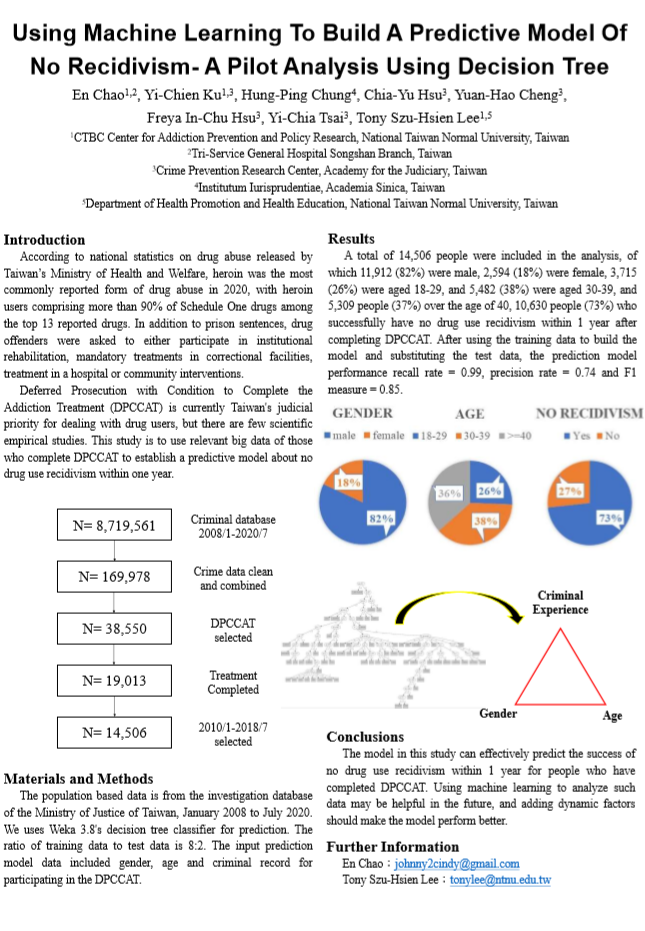Poster Presented at 2022 NIDA International Forum
- Publication Date:
- Last updated:2022-06-20
- View count:921
To expand the academic publication of the research results from the 2021 Drug Prevention Fund, the Crime Prevention Research Center (CPRC) of the Academy for the Judiciary collaborated with the CTBC Center for addiction Prevention and Policy Research of National Taiwan Normal University to present a poster titled "Using Machine Learning To Build A Predictive Model Of No Recidivism- A Pilot Analysis Using Decision Tree" at the 2022 NIDA International Forum from June 9, to June 15. Dr. En Chao is the first author of this poster under the supervision of Dr. Tony Szu-Hsien Lee.
CPRC has long been following the issues of the efficacy of diversified treatment and social reintegration for drug offenders. With the support of the 2021 Drug Prevention fund, CPRC conducted a research project titled "Evaluation and Comparison of the Effectiveness of Diversified Treatment for Drug Users: Phase 4"(ECEDT). The results of the project suggested that compared to traditional penalties, diversified treatment can not only help drug users maintain social functions but also reduce recidivism. However, the treatment should be carried out according to different types and patterns of drug use.
Although there is a trend of increasing the rate of implementation of deferred prosecution and diversified treatment under the New Generation Anti-Drug Strategy Action Plan 2.0, there is a lack of scientific and systematic research to prove the effectiveness of deferred prosecution with condition to complete addiction treatment (DPCCAT). Dr. Chao analyzed a big dataset from project ECEDT and establish a machine learning model to predict the probability of non-recidivism after one year for 14,506 people who completed DPCCAT with an F1 score of 0.85.
In the conclusion, the research team pointed out that the significance of predicting non-recidivism among those who completed DPCCAT lies in the fact that the large data contains various static factors that help frontline practitioners to evaluate the risk and needs of patients with drug use problems in order to plan appropriate treatment strategies. At the same time, the research team advises that the government should continue to allocate resources to the application of AI in drug research, to complement the database of dynamic and static factors, and improve recidivism prediction models. The researcher also advocates the use of evidence-based policies that will not only facilitate the ongoing strategy of “Recidivism Prevention through the Judicial Process of Drug Offenders," developed by the Ministry of Justice but will also contribute to the achievement of the goal of the New Generation Anti-Drug Strategy 2.0 in a practical sense.



Attachment List
- poster presentation.pdf353 KB 2022-06-07 Count Views:338
- NIDA-poster-guide-2022.pdf701 KB 2022-06-07 Count Views:372

